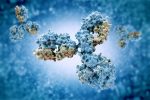Hsp70 Autoantibodies Elevated in EBA, May Contribute to Disease
A member of a family of proteins called chaperones, Hsp70 levels are increased during cellular stress

Self-reactive antibodies against the stress-induced heat shock protein 70 (Hsp70) were higher in the blood of patients with epidermolysis bullosa acquisita (EBA), a study found.
In a corresponding mouse model, the researchers observed the autoantibodies contributed to a worse disease course, likely through the mediation of inflammatory pathways.
“This work expands existing knowledge about the direct contribution of extracellular Hsp70 in EBA,” they wrote, adding their findings may have “implications for novel biomarker development” and new treatment approaches.
The study, “Pathological Relevance of Anti-Hsp70 IgG Autoantibodies in Epidermolysis Bullosa Acquisita,” was published in Frontiers in Immunology.
EBA is a rare autoimmune disease marked by the body’s mistaken attack on collagen type VII, a structural protein involved in anchoring layers of skin together. In inflammatory EBA, immune cell types often infiltrate between the layers of skin, causing inflammation and leading to skin degradation and blisters.
Hsp70 belongs to a family of proteins called chaperones. Its levels increase during cellular stress, where it influences the activation of the immune system. Previously, a research team uncovered a role for Hsp70 in EBA.
They found that circulating blood levels of Hsp70 were increased in a mouse model of inflammatory EBA and that when the mice were treated with additional Hsp70, disease severity worsened. Hsp70 works to stimulate the secretion of pro-inflammatory molecules from immune cells, evidence also suggests.
The exact role of Hsp70 in mediating autoimmunity remains unclear, however. The activation of Hsp70 may drive anti-Hsp70 antibody generation, but it’s not known if these antibodies are involved in EBA.
Researchers here investigated the role of anti-Hsp70 autoantibodies in EBA.
To do so, they collected serum — the liquid component of blood — from 20 people with EBA and 40 healthy donors, and evaluated the levels of circulating anti-Hsp70 autoantibodies.
Results showed that levels of blood circulating autoantibodies (called anti-Hsp70 IgG) were significantly higher among EBA patients than healthy donors. More specifically, half showed positivity for these antibodies, whereas no healthy participants were positive.
Patients also showed significantly increased levels of interferon-gamma, a pro-inflammatory molecule, which was positively correlated with anti-Hsp70 IgG levels.
Hsp70 autoantibody levels were similarly increased in a mouse model of inflammatory EBA, and a trend toward increased interferon-gamma was observed.
To further probe the role of anti-Hsp70 IgG in contributing to disease, the researchers administered the antibodies in the same mouse model of EBA. They found that mice that received the antibodies showed a greater disease severity compared to those not injected with anti-Hsp70 IgG.
Further, the antibody-administered mice showed a significantly higher infiltration of neutrophils between skin layers than control mice. Neutrophils are an immune cell type implicated in EBA progression. Skin biopsies showed that the activation of nuclear factor kappa B (NF-kB), an inflammatory molecule known to play a role in autoimmunity, was significantly enhanced in mice that received anti-Hsp70 IgG.
Overall, the findings support a role for anti-Hsp70 antibodies in contributing to EBA progression, the team noted.
While the exact mechanisms by which they do this are not certain, the researchers hypothesized that anti-Hsp70 IgG, “may contribute to EBA development via enhanced neutrophil infiltration to the skin and activation of the NF-kB signaling pathway in an [interferon-gamma-associated] manner.”
“Since the NF-kB signaling pathway is known to play a key role in inflammatory processes, it may represent a possible target for the treatment of autoimmune diseases including those of the bullous [blistering] type,” the team added.
More work is needed to better understand the relative role of anti-Hsp70 antibodies in inflammatory and non-inflammatory forms of EBA, the researchers noted.







